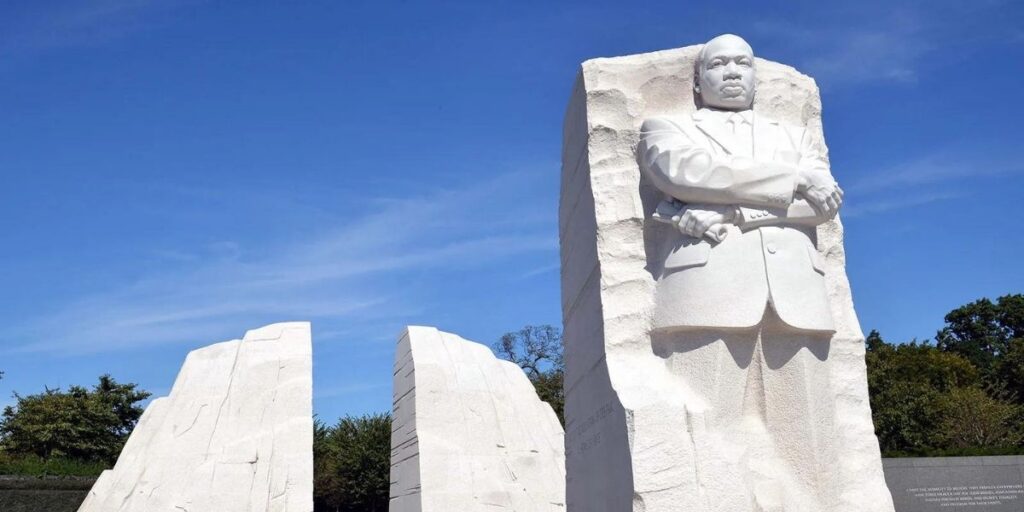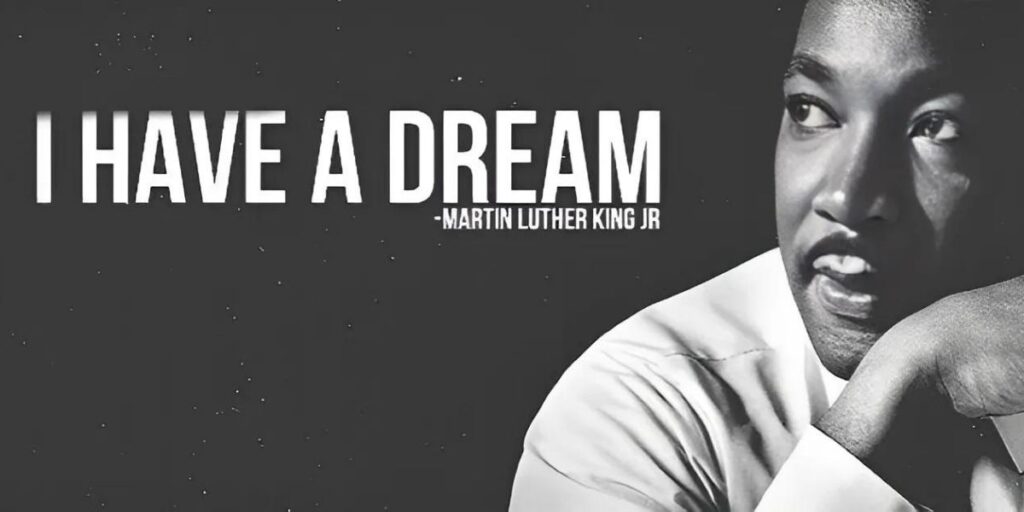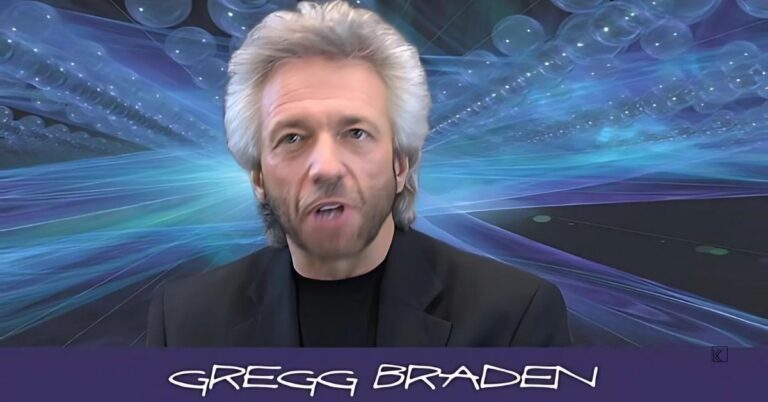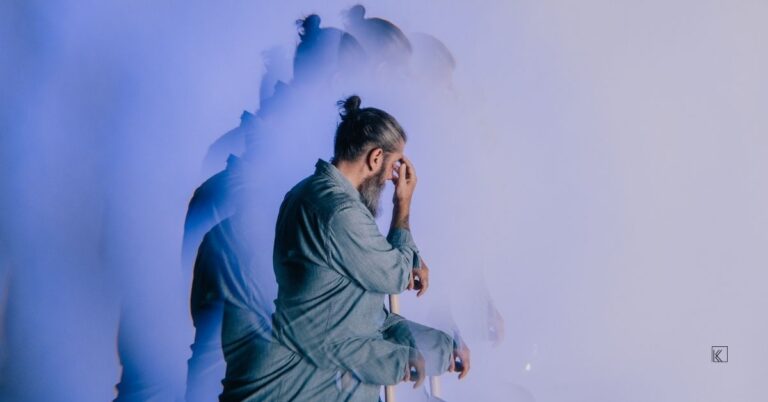What Makes Martin Luther King, Jr., so important? Was it his faith, race or the movement he was such an important part of? I think it’s a combination of things because he was involved in the Civil Rights Movement from the very beginning, and if it wasn’t for this involvement, who knows where Civil Rights in the United States would be today. There is a plethora of information on Dr. King and the Civil Rights Movement that would possibly make up a small book, that I have only done a small amount here on this important gentleman.
Martin Luther King, Jr. was an American pastor, activist, humanitarian, and leader in the African-American Civil Rights Movement. He is best known for his role in the advancement of civil rights using nonviolent civil disobedience based on his Christian beliefs.
Born Michael King, his father changed his name in honor of reformer Martin Luther. A Baptist minister, King became a civil rights activist early in his career. He led the 1955 Montgomery Bus Boycott and helped found the Southern Christian Leadership Conference (SCLC) in 1957, serving as its first president. King also helped to organize the 1963 March on Washington, where he delivered his “I Have a Dream” speech. There, he established his reputation as one of the greatest orators in American history. He also established his reputation as a radical, and became an object of the FBI for the rest of his life. FBI agents investigated him for possible communist ties, recorded his extramarital liaisons and reported on them to government officials, and on one occasion, mailed King a threatening anonymous letter that he interpreted as an attempt to make him commit suicide.
On October 14, 1964, King received the Nobel Peace Prize for combating racial inequality through nonviolence. In 1965, he and the SCLC helped to organize the Selma to Montgomery marches and the following year, he took the movement north to Chicago. In the final years of his life, King expanded his focus to include poverty and the Vietnam War, alienating many of his liberal allies with a 1967 speech titled “Beyond Vietnam.” In 1968, King was planning a national occupation of Washington, D.C., to be called the Poor People’s Campaign, when he was assassinated on April 4, in Memphis, Tennessee. Allegations that James Earl Ray, the man convicted of killing King, had been framed or acted in concert with government agents persisted for decades after the shooting.
King was awarded the Presidential Medal of Freedom and the Congressional Gold Medal posthumously. Martin Luther King, Jr. Day was established as a U.S. federal holiday in 1986. Hundreds of streets and a county in the U.S. have been renamed in his honor. A memorial status on the National Mall was opened to the public in 2011.

As a Christian minister, Martin Luther King’s main influence was Jesus Christ and the Christian gospels, which he would almost always quote in his religious meetings, speeches at church, and in public discourses. King’s faith was strongly based in Jesus’ commandment of loving your neighbor as yourself, loving God above all, and loving your enemies, praying for them and blessing them. His non-violent thought was also based in the injunction to turn the other cheek in the Sermon on the Mount, and Jesus’ teaching of putting the sword back into its place In his famous Letter from Birmingham Jail, King urged action consistent with what he describes as Jesus’ “extremist” love, and also quoted numerous other Christian pacifist authors, which was very usual for him. In his speech I’ve been to the Mountaintop, he stated that he just wanted to do God’s will.
Inspired by Mahatma Gandhi’s success with non-violent activism, King had “for a long time…wanted to take a trip to India.” With assistance from the Quaker group the American Friends Service Committee, he was able to make the journey in April 1959. The trip to India affected King, deepening his understanding of non-violent resistance and his commitment to America’s struggle for civil rights.
In a radio address made during his final evening in India, King reflected, “Since being in India, I am more convinced than ever before that the method of nonviolent resistance is the most potent weapon available to oppressed people in their struggle for justice and human dignity”.
King’s admiration of Gandhi’s non-violence did not diminish in later years, he went so far as to hold up his example when receiving the Nobel Peace Prize in 1964, hailing the “successful precedent” of using non-violence “in a magnificent way by Mohandas K. Gandhi to Challenge the might of the British Empire. He struggled only with the weapons of truth, soul force, non-injury and courage.” Gandhi seemed to have influenced him with certain moral principles; both Gandhi and Martin Luther King had read Tolstoy. All three men—Tolstoy, Gandhi, and King—had been influenced by Jesus’ teachings on non-violent resistance to evil force.
As the leader of the SCLC, King maintained a policy of not publicly endorsing a U.S. political party or candidate: “I feel someone must remain in the position of non-alignment, so that he can look objectively at both parties and be the conscience of both—not the servant or master of either. In a 1958 interview, he expressed his view that neither party was perfect, saying, “I don’t think the Republican Party is a party full of the almighty God nor is the Democratic Party. They both have weaknesses.
And I’m not inextricably bound to either party.” Although King never publicly supported a political party or candidate for president, in a letter to a civil rights supporter in October 1956 he said that he was undecided as to whether he would vote for Adlai Stevenson or Dwight Eisenhower, but that “In the past I always voted the Democratic ticket.”
In his autobiography, King says that in 1960 he privately voted for Democratic candidate John F. F. Kennedy. “I felt that Kennedy would make the best president. I never came out with an endorsement. My father did, but I never made one.” King adds that he likely would have made an exception to his non-endorsement policy for a second Kennedy term, saying “Had President Kennedy lived; I would probably have endorsed him in 1964.”
On December 1, 1955, Rosa Parks was arrested for refusing to give up her seat. The Montgomery Bus Boycott urged and planned by Nixon and led by King, soon followed. The boycott lasted for 385 days, and the situation became so tense that King’s house was bombed King’s role in the bus boycott transformed him into a national figure and the best-known spokesman of the civil rights movement.
King believed that organized, nonviolent protest against the system of southern segregation known as Jim Crow laws would lead to extensive media coverage of the struggle for black equality and voting rights. Journalistic accounts and televised footage of the daily deprivation and indignities suffered by southern blacks, and of segregationist violence and harassment of civil rights workers and marchers, produced a wave of sympathetic public opinion that convinced the majority of Americans that the Civil Rights
Movement was the most important issue in American politics in the early 1960s. King organized and led marches for blacks’ right to vote, desegregation, labor rights and other basic civil rights. The SCLC’s 1957 Prayer Pilgrimage for Freedom was the first time King addressed a national audience. Most of these rights were successfully enacted into the law of the United States with the passage of the Civil Rights Act of 1964 and the 1965 Voting Rights Act.
King and the SCLC put into practice many of the principles of the Christian Left and applied the tactics of nonviolent protest with great success by strategically choosing the method of protest and the places in which protests were carried out. There were often dramatic stand-offs with segregationist authorities. Sometimes these confrontations turned violent.
In April 1963, the SCLC began a campaign against racial segregation and economic injustice in Birmingham, Alabama. The campaign used nonviolent but intentionally confrontational tactics, developed in part by Rev. Wyatt Tee Walker. Black people in Birmingham, organizing with the SCLC, occupied public spaces with marches and sit-ins, openly violating laws that they considered unjust.
King’s intent was to provoke mass arrests and “create a situation so crisis-packed that it will inevitably open the door to negotiation”. However, the campaign’s early volunteers did not succeed in shutting down the city, or in drawing media attention to the police’s actions. Over the concerns of an uncertain King, SCLC strategist James Bevel changed the course of the campaign by recruiting children and young adults to join in the demonstrations.
The March on Washington originally was conceived as an event to dramatize the desperate condition of blacks in the southern U.S. and an opportunity to place organizers’ concerns and grievances squarely before the seat of power in the nation’s capital. Organizers intended to denounce the federal government for its failure to safeguard the civil rights and physical safety of civil rights workers and blacks. However, the group acquiesced to presidential pressure and influence, and the event ultimately took on a far less strident tone.
As a result, some civil rights activists felt it presented an inaccurate, sanitized pageant of racial harmony; Malcolm X called it the “Farce on Washington”, and the Nation of Islam forbade its members from attending the march. The march did, however, make specific demands: an end to racial segregation in public schools; meaningful civil rights legislation, including a law prohibiting racial discrimination in employment; protection of civil rights workers from police brutality; a $2 minimum wage for all workers; and self-government for Washington, DC., then governed by congressional committee. Despite tensions, the march was a resounding success. More than a quarter of a million people of diverse ethnicities attended the event, sprawling from the steps of the Lincoln Memorial onto the National Mall and around the reflecting pool.
At the time, it was the largest gathering of protesters in Washington, D.C.’s history. King delivered a 17-minute speech, later known as “I Have a Dream.” In the speech’s most famous passage—in which he departed from his prepared text, possibly at the prompting of Mahalia Jackson, who shouted behind him, “Tell them about the dream!”—King said:

I say to you today, my friends, so even though we face the difficulties of today and tomorrow, I still have a dream. It is a dream deeply rooted in the American dream.
I have a dream that one day this nation will rise up and live out the true meaning of its creed: ‘We hold these truths to be self-evident: that all men are created equal.’
I have a dream that one day on the red hills of Georgia the sons of former slaves and the sons of former slave owners will be able to sit down together at the table of brotherhood
I have a dream that one day even the state of Mississippi, a state sweltering with the heat of injustice, sweltering with the heat of oppression, will be transformed into an oasis of freedom and justice.
I have a dream that my four little children will one day live in a nation where they will not be judged by the color of their skin but by the content of their character.
I have a dream today.
I have a dream that one day, down in Alabama, with its vicious racists, with its governor having his lips dripping with the words of interposition and nullification; one day right there in Alabama, little black boys and black girls will be able to join hands with little white boys and white girls as sisters and brothers.I have a dream today.
“I Have a Dream” came to be regarded as one of the finest speeches in the history of American oratory. The March, and especially King’s speech, helped put civil rights at the top of the agenda of reformers in the United States and facilitated passage of the Civil Rights Act of 1964.
The original, typewritten copy of the speech, including Dr. King’s handwritten notes on it, was discovered in 1984 to be in the hands of George Raveling, the first African-American basketball coach of the University of Iowa. In 1963, Raveling, then 26, was standing near the podium, and immediately after the oration, impulsively asked King if he could have his copy of the speech. He got it.





